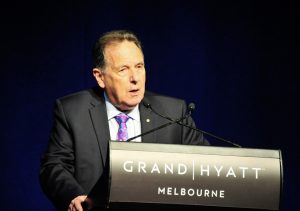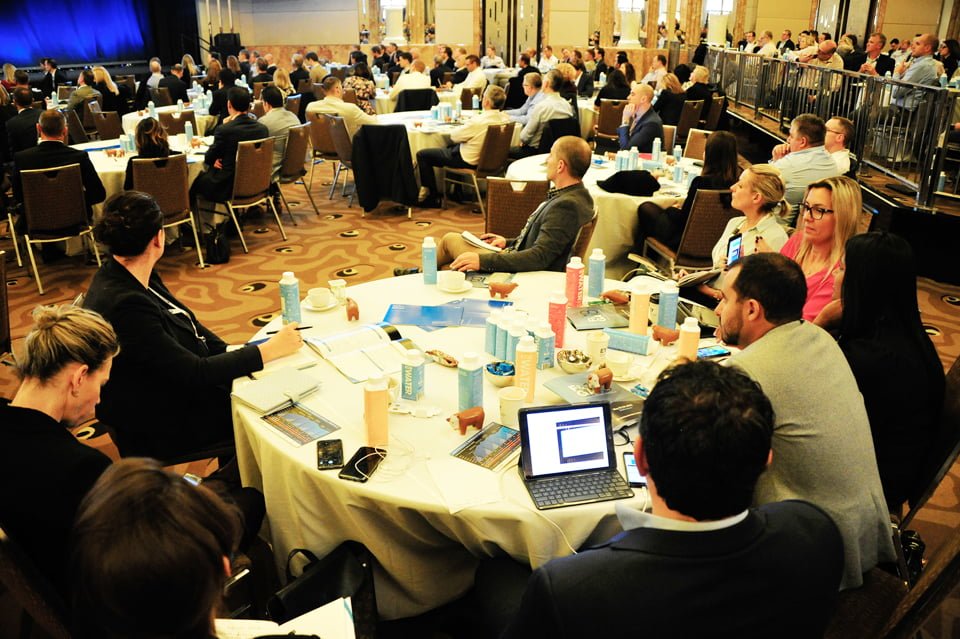Customers are keeping Australia’s FMCG and retail sectors focused on how best to dazzle, capture, and retain their business over a lifetime – and beyond.
The customer-centric revolution was the key topic at Food and Grocery Australia 2018 held in Melbourne last month. The two-day program featured local and international speakers, providing insights into technologies, social trends and commercial dynamics that are shaping the way consumers connect with products and brands, and driving the future of Australia’s $127 billion food and grocery sector.
Vive la revolution
Woolworths Supermarkets Managing Director Claire Peters opened the event with glimpses into retailers’ strategies to keep the customer “at the heart of everything they do”, such as localising Woolworths’ ranging, differentiation and service innovations.
Coles CEO John Durkan closed the bill the following day with insights into the reinvigoration of Coles’ operations and the retailer’s response to customer feedback, including a commitment to everyday low pricing and promotions, complemented by new product and service offerings.
Consumer expert Christopher Zinn gave his take on how to satisfy ever-increasing consumer expectations. According to Mr Zinn, products that demonstrate value beyond price and brands that engender trust will be the big winners in the consumer loyalty race.
A snapshot of the consumer and retail employment landscape in 2025 was provided by social analyst Mark McCrindle. Mr McCrindle spoke of the demographic and generational shifts that are altering society forever and highlighted those megatrends that leaders will need to navigate to futureproof their organisations. Neilsen’s Justin Sargent then took a micro perspective on what’s required for commercial growth: business will need agility, decisiveness, flexibility and a willingness to throw all their resources at increasing their knowledge of customer behaviour.
Brand trust is paramount
Underpinning the central theme of customer-as-king-or-queen is the need for business to understand and respond to consumers’ increasingly demanding brand expectations. Real World Marketing’s Paul Bull spoke about the evolution of brand expectations and drew inspiration from brands that have delivered in innovative and impactful ways.
Woolworths Director of Longlife, Space & Insights Peter McNamara looked at building brand trust through times of transition. He spoke about some of the lessons the retailer has learnt from the more challenging periods in history and gave examples of customer-led decision making and use of key customer metrics to orientate the organisation culturally. According to Mondeléz International’s Kjetil Undhjem , brand relevance is more important than ever, and establishing relevance in a saturated market is achieved by being bold, always asking ‘why’ and never fearing your heritage.
A panel of Ernst & Young executives and industry experts also gave examples of innovations and technologies – such as augmented reality and social enterprise – that will help brands succeed in an era when connecting with the consumer is paramount.
A different strategy for inspiring brand trust came from KPMG’s Laszlo Peter, who explained blockchain in a FMCG setting and its potential for delivering solutions to challenges such as food waste and improving transparency through food traceability.
Bracing for disruption
Another key topic discussed at Food and Grocery Australia was the impending disruption from overseas players such as Amazon. Research Farm’s Daniel Lucht used AmazonFresh and Whole Foods’ experience in the US and Europe to demonstrate the potential impact the online giant will have on the Australian market.
Mr Lucht argued that a shake-up of the local food industry is inevitable, though when this disruption will actually be felt, and to what extent, remains to be seen.
Aptos’ Nikki Baird also explored the frontlines of the Australian food and grocery sector in competition with Amazon, as well as shifting expectations that millennials and generation Z are bringing to the retail relationship and the role that data will play in this space. “Retail is increasingly not a product business,” she said. “It’s a data business.”
Driving success in a competitive market
Examples of innovative business models were also presented at the event. Sarah Prescott from social enterprise Thankyou spoke of the ways in which Thankyou has challenged the thinking behind traditional FMCG business models by shifting to a new paradigm that realises “the belief that we all have the power to change stuff”.
Focusing on this human-to-human connection – creating agile products and brands with big personalities – has also been one of the key contributors to Chobani Australia’s ongoing success, said Managing Director Peter Meek.
A more analytical perspective on market competition came from highlights of the 4th annual UBS/AFGC Supplier Survey delivered by Ben Gilbert. The survey looks at those supplier categories that are outperforming and underperforming, and why. Mr Gilbert also spoke about the strategic priorities for suppliers (cost out, innovation) and retailers (price, loyalty, ranging, online and refurbishments) and gave an insight into what the future holds for both sectors.
Citi’s Craig Woolford offered a positive outlook on the future of the industry with research that indicates that food and grocery is entering a period of growth, driven by a slow return of price inflation, lifting profit margins and suppliers making better use of export, restaurant and café channels.
Arguably the most anticipated session at the conference was that of Professor Graeme Samuel AC, who delivered highlights from his review of the Food and Grocery Code of Conduct (FGCC). Delegates heard first-hand about the key recommended areas of change, areas that will probably be included in the preliminary draft report due for release in June. These include the FGCC remaining a voluntary code and the enhancement of the code-compliance process through the appointment of an independent code adjudicator to each signatory.
Food and Grocery Australia 2018 was held on May 22-24 at the Grand Hyatt Melbourne. Convened by the Australian Food and Grocery Council (AFGC), Food and Grocery Australia is the key annual event for Australia’s FMCG sector and its stakeholders. Food and Grocery Australia 2019 is being held on May 28-30, 2019 at the Hilton Sydney. Keep your eyes on www.afgc.org.au for further details.





